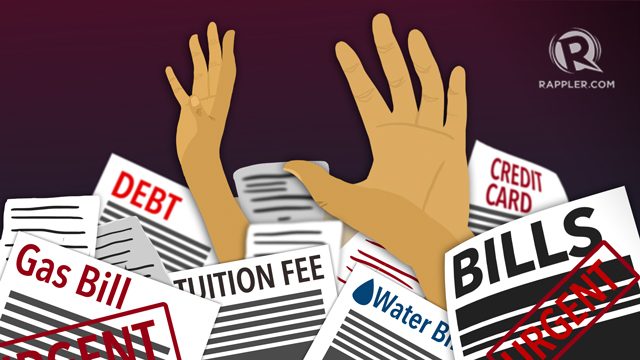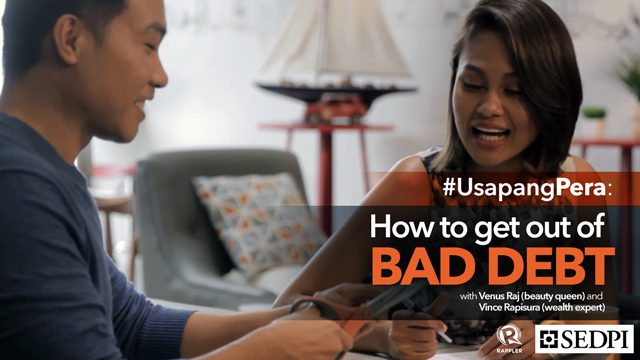SUMMARY
This is AI generated summarization, which may have errors. For context, always refer to the full article.

MANILA, Philippines – Despite the higher income that overseas Filipino workers (OFWs) get abroad, many of them still fail to manage their finances well – going home empty-handed and sometimes even burdened by debt.
Borrowing money is common among many Filipinos. A survey by the Bangko Sentral ng Pilipinas (BSP) shows that eight in ten Filipinos have experienced borrowing money. The most common purposes for borrowing money is to buy food, pay for school-related expenses, and finance emergencies.
OFWs are no exemptions to the culture of borrowing. Many OFWs leave to be able to pay for their loans or borrow money in order to finance their move overseas. With loans hounding them, OFWs fail to save and often end up overextending their stay abroad.
Vince Rapisura, president of the Social Enterprise Development Partnerships, Inc., a social enterprise that provides financial literacy trainings to low-income OFWs in 15 countries worldwide, recently launched a book entitled (L)earning Wealth: Successful Strategies in Money Management.
According to Vince, there are a few things an OFW should consider before borrowing money.
When is borrowing okay?
Vince suggests that OFWs follow these 5 cardinal rules of borrowing:
- Borrow money only when you plan to use it for productive purposes. This means using the money to finance something that creates income.
- Income from this project should be greater than the interest you will pay.
- Installment amount should not exceed 20% of your regular income.
- Do not borrow to finance wants. To be able to buy the things you want, save for it or create an investment portfolio that will provide you with a passive income.
- Lastly, borrow only from formal financial sources. This way, you can take advantage of lower interest rates and establish your credit history.
Filipinos often borrow for emergencies, which according to Vince, should be avoided.
Ask yourself the following questions before getting a loan:
- Do I really need this loan?
- Will this loan help me earn more money?
- Can I afford the borrowing cost of this loan?
From whom should I borrow?
At least 71% of Filipinos who borrow money get it from informal sources – family, relatives, friends, and informal money lenders. Only 4% borrow from banks.
According to Vince, it is best to borrow from formal financial institutions since they offer the best rates available in the market and are subjected to strict regulations.
There is no standard prescribed interest rate for loans, but Vince suggests that you look for the lowest interest rate available and make sure that the return from the investment (if you used the loan to invest) is higher than the interest you need to pay.

How do I get out of bad debt?
What are bad debts? Vince says bad debts are those used for non-productive purposes.
Many OFWs resort to borrowing money, especially during emergencies, and learn the hard way that this is not good. But it is never too late. Here are 4 steps to free yourselves from bad debt:
- The first step is to stop incurring even more bad debt. Stop making loans that are not used for productive purposes.
- The second step is making a list of your bad debts. You have to know your enemy. If you borrowed money from informal sources without a contract, initiate one. List the debts from the highest to the lowest effective interest rate.
- Now check if the total installment amount or minimum payment required is below 20% of your gross income. If not, try to negotiate the terms and conditions with your creditor. You may offer to lengthen the period of your loan to make payments more affordable. If not, you may try looking for other means of creating income or scrimp on expenses.
- After that, pay the installment amount or the minimum required payment for each loan. If you have excess money after paying the loan with the least effective interest rate, use it to make an additional loan with the highest interest rate. You should aim to get rid of loans with the highest interest rates first.

#UsapangPera
To help even more OFWs and young professionals manage their finances better, SEDPI produces weekly webisodes featuring Vince Rapisura and beauty queen Venus Raj entitled #UsapangPera.
The second episode, to be released on Friday, August 5 at 7pm, will also tackle debt and related problems. Bookmark this page and watch it here on Rappler! – Rappler.com
SEDPI is a Philippine-based capacity-builder in the fields of microfinance, social entrepreneurship, and financial literacy. Learn more about them here.
Got questions for SEDPI about managing your finances? Email us at balikbayan@rappler.com.
Add a comment
How does this make you feel?
There are no comments yet. Add your comment to start the conversation.